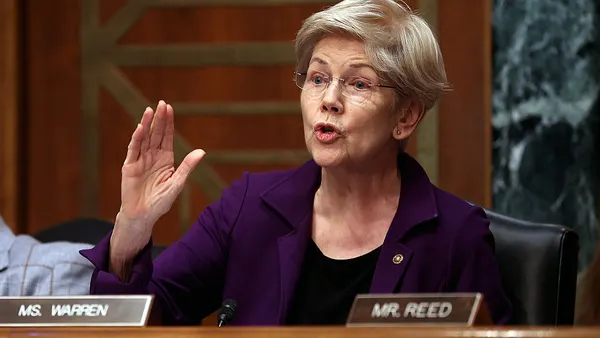Dive Brief:
- Comerica’s chief risk officer, Brian Goldman, is leaving the bank to take the same role at USAA.
- In a Wednesday morning securities filing, Dallas-based Comerica said Goldman is leaving the bank “to pursue another opportunity, effective May 23.” Later Wednesday, San Antonio-based USAA announced Goldman as its new risk chief, effective May 27.
- Goldman, who’s also held the title of senior executive vice president, joined Comerica in December 2023. While Comerica searches for a new chief risk officer, Melinda Chausse, the bank’s chief credit officer, will take on risk chief duties on an interim basis, the bank said in the filing.
Dive Insight:
Before Comerica, Goldman spent about 3½ years in operational risk roles at Citi, and, before that, more than 20 years at Goldman Sachs, where he held risk-related roles for about a decade, according to his LinkedIn profile.
USAA, in its release, highlighted Goldman’s experience leading “a comprehensive transformation of the bank’s risk function” at Comerica, and his “proven track record of building and strengthening risk functions in large, complex organizations to achieve strategic goals.”

That experience likely appealed to USAA, which has run into a number of regulatory issues in recent years. The Office of the Comptroller of the Currency in December issued a “comprehensive” cease-and-desist order against USAA Federal Savings Bank, calling out the lender for its “noncompliance” with elements of previously issued orders and OCC requirements. The bank was directed to fix “a range of deficiencies,” and improve its risk and compliance management efforts.
USAA’s interim risk chief, George Stamatelatos, left the company in April to become TD’s U.S. chief auditor, according to his LinkedIn profile. USAA’s former chief risk officer, Neeraj Singh, was named M&T Bank’s next CRO in January. USAA provides banking and insurance products to military members, veterans and their families.
“Brian’s extensive expertise and leadership in risk management will be a tremendous asset as we strengthen our capabilities and continue to deliver on our mission,” USAA CEO Juan Andrade said in a statement. “He is the right leader to enhance our risk management culture, which is essential to safeguarding our members’ financial well-being, driving sustainable economics and delivering lasting value to members.”
Goldman informed Comerica of his decision, which “was not the result of any disagreement with Comerica or Comerica’s Board of Directors,” on May 8, the filing said. His compensation last year totaled $3.8 million, according to the bank’s latest proxy filing; he received a $1.2 million signing bonus when hired.
In his short time at Comerica, Goldman enhanced the company’s risk management model and practices, worked to mature its capabilities and upskill employees and improved risk reporting, the bank said in the proxy filing.
In April 2024, after the OCC discovered unsafe or unsound practices related to risk governance framework and internal controls, the regulator hit Comerica Bank & Trust – a niche national bank separate from Comerica Bank – with an enforcement action. The subsidiary was ordered to establish a compliance committee as well as adequate board oversight and a corporate governance program.
That order appeared to be the culmination of an issue within the bank’s trust unit related to a wealth management technology platform upgrade, analysts said. In December 2023, The Wall Street Journal reported that the OCC was scrutinizing a wealth management platform change Comerica made in May 2023, after the technology update resulted in widespread transaction errors and the bank overdrawing its own accounts by millions of dollars.
The OCC also told the bank to adopt a program to assess and manage third-party relationship risks, enhance its internal audit program and bolster internal controls. The bank also agreed to establish a program designed to mitigate risks related to information technology assets.
Also last year, Comerica informed investors it would no longer serve as the Treasury Department’s bank partner for its Direct Express prepaid card program, a role it had held since 2008. Comerica found itself in hot water after it allowed a third-party vendor, i2c, to field fraud disputes and handle cardholder data from an office in Pakistan, when the Treasury Department required all Direct Express services be provided in the U.S. or its territories, American Banker reported.
The Consumer Financial Protection Bureau, under the Biden-era leadership of Rohit Chopra, began investigating Comerica’s handling of the Direct Express program, which prompted the bank to file a lawsuit against the consumer watchdog calling the probe “aggressive and overreaching.”
The CFPB, a month later, filed a lawsuit against the bank stemming from that investigation, charging the bank with “systematically failing” 3.4 million federal benefits recipients who held Direct Express prepaid cards with intentionally poor customer service and illegally harvested junk fees.
Last month, the bureau – under Trump administration leadership – dropped the case against the bank, although without prejudice, meaning the CFPB could refile the lawsuit. The CFPB had requested more time in the case, which the bank pushed back on; a judge denied the bureau’s request.











